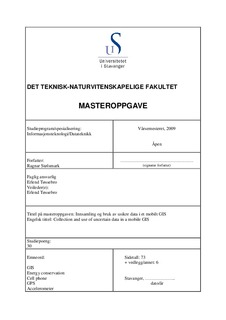| dc.contributor.author | Stølsmark, Ragnar | |
| dc.date.accessioned | 2009-10-29T08:56:07Z | |
| dc.date.issued | 2009 | |
| dc.identifier.uri | http://hdl.handle.net/11250/181667 | |
| dc.description | Master's thesis in Information technology | en |
| dc.description.abstract | This study looked into the possibility of saving power in mobile geographical information
systems by extending the interval between GPS updates. A J2ME application has been
developed to test this theory. Via a map it can guide the user to his destination. The program
displays the current uncertainty of the user’s position. This uncertainty spreads out until the
next GPS update is received. To make the long update intervals transparent to the user, a dead
reckoning scheme was included. The application tries to guess where the user is, based on
different input like the previous position or data from the phone’s accelerometer. Both the
spreading of the uncertainty and the dead reckoning has different implementations for driving
and walking. The tests of the application showed that the phone battery lasted approximately
4 times longer when going from 2 seconds GPS update intervals, to only updating when the
uncertainty exceeded 500 meters in diameter. The results lead to the conclusion that extending
the update intervals is a great way to achieve longer battery life for mobile applications which
rely on a GPS receiver. | en |
| dc.format.extent | 1181195 bytes | |
| dc.format.mimetype | application/pdf | |
| dc.language.iso | eng | en |
| dc.publisher | University of Stavanger, Norway | en |
| dc.relation.ispartofseries | Masteroppgave/UIS-TN-IDE/2009 | en |
| dc.subject | informasjonsteknologi | en |
| dc.subject | datateknikk | en |
| dc.subject | GIS | en |
| dc.subject | energy conservation | en |
| dc.subject | cell phone | en |
| dc.subject | GPS | en |
| dc.subject | accelerometer | en |
| dc.title | Collection and use of uncertain data in a mobile GIS | en |
| dc.type | Master thesis | en |
| dc.subject.nsi | VDP::Technology: 500::Information and communication technology: 550::Computer technology: 551 | en |
